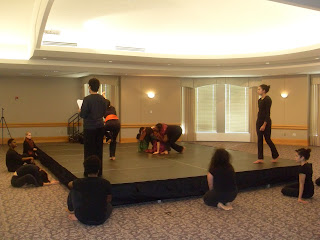 |
| Dance performance of true stories of refugee and immigrant women. |
The Refugee and Immigrant Women for Change (RIWC) International Women's Day event was held on March 8, at the University of St. Catherine from three o'clock to six-thirty in the evening. A crowd of approximately two hundred people, mostly women, youth and men of different backgrounds from ethnic and mainstream communities were in attendance. I, personally, was glad to see that refugee and immigrant women were present at the the table and fully participating in every aspect of the event.
RIWC is a coalition made of seven ethnic-community-based organizations (Asian, African and Latino), formed around the shared vision of fostering organizational leadership, community accountability and capacity-building of member organizations around gender equity for refugee and immigrant women. Learn more...
Welcome and opening remarks were made by Dr. Alan Silva, St. Catherine's Dean of the School of humanities, Arts and Sciences, and Mariam Mohamed, community advocate and board member of CAPI (RIWC member organization.
The main attraction was a dance performance choreographed to stories of refugee and immigrant women collected through eighteen focus groups and about one hundred and sixty-five participants (women, men, youth). The performance was entitled “We Are Not Below the Men: Riwa meets Kartee.” I thought the performance was very powerful. Even more powerful were the stories shared by participants of RIWC focus groups. You had to be there to see it and experience it for yourself.
As I watched the performance and listened to the stories, I jotted down some themes that ring true for many in our communities—hope they make sense to you:
- Many refugees and immigrants come to America in search of opportunities and “a better life” but...
- Some men feel frustrated about not doing (or having the ability to do) enough to support their families—they feel a strong sense of failure
- Some women hear—“you don't need a man to be a success in this country”
- Some women feel lonely and depressed--- not feeling taken cared of; no respected
- Sometimes divisions build between the old and the young, the men and the women, the parents and the children
- Some people look to religious leaders and institutions to keep the peace in their households, relationships and marriages
- Some men feel powerless
- Some elders feel disrespected, diminished, invisible
- Sometimes education (in different forms) can be a huge barrier to success
- Sometimes we (as individuals) are not always aware of our anger, depression or feelings of hopelessness
- Sometimes we are pleasantly surprise that the “old way” of doing things can actually produce positive results in these modern times—it reminds us not to be too quick to dismiss ideas from the “village”
- Sometimes we believe that the only way to succeed is through formal education—and we hang a lot (sometimes way too much) on that idea
- Some youngsters feel pressured to succeed—the entire family is watching and waiting...
- Some people step up to leadership even when they are not asked or when it involves serious sacrifices because they feel that “someone” has to “take care of our people”
- Sometimes we come to the conclusion that our children will learn in their own time
- Sometimes we are as proud of our daughters as we are our sons
- Sometimes we are confident that nothing can stand in the way of our success
- Sometimes we realize that we are doing the best we can; we can all work together; not on the top or the bottom but side by side
- Sometimes we get it---this America we now call home has its problems and its rewards too.
The performance and stories affirmed a lot of what I already knew. However, the real highlight of the event was the community dialogue. As a facilitator, I enjoyed the opportunity to really listen and encourage people to share their thoughts, insights and ideas about gender equity for refugee and immigrant women and RIWC in general.
One gentleman at my table summed it nicely, I thought. He said that our lives are full of complexities and social service organizations and experts are only now beginning to learn that we can't just fix one thing and send the individual on his or her way, we need to take a holistic approach and spend more time understanding.
I believe that community dialogue is always a great start for “understanding.”

No comments:
Post a Comment